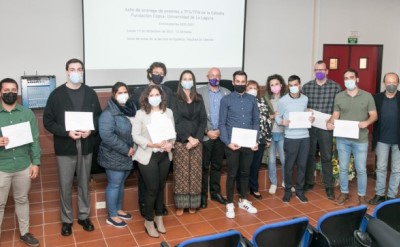- The winners of the 2021 edition are Alberto Méndez, Stefano Panzeri, Javier Díaz and Ricardo García, in the case of the Bachelor’s Thesis, and Augusto Hernández, in the case of the Master’s Thesis
- A total of 21 papers were submitted in this second call for proposals.
The Fundación Cepsa Chair of Ecological Transition and Innovation of the University of La Laguna held the second edition of its Awards for best Bachelor’s Thesis and best Master’s Thesis. The purpose of these awards is to recognize academic research that has been presented at the University of La Laguna (ULL) in both categories, which stands out for its originality, quality and degree of innovation in the subjects covered by the Chair.
The first Bachelor’s Thesis award went this year to Alberto Méndez García and Stefano Panzeri Reyes for their work 'Design and implementation of an autonomous waste detection and classification system', while the second went to Javier Díaz Amador for 'Experimental project for the design of products from locally recycled materials', and the third to Ricardo García González for 'Analysis of the potential for reducing CO2 emissions through the electrification of Tenerife's car fleet'.
In the case of the best Master’s Thesis, the first prize was awarded to Augusto Samuel Hernández Martín, for the 'Development of a BMS and its battery for isolated systems', while the second and third prizes in this category were not awarded. That situation meant that on this occasion the amount of the prizes, which totaled 3,600 euros, was not distributed in its entirety.
The Awards are intended to be an incentive to promote research activity among the students of the University of La Laguna and to encourage future academic work that will contribute, in particular, to advancing the ecological transition.
The use of waste for energy and the circular economy; transportation logistics; energy efficiency in buildings and facilities; reduction of environmental impact in individual or collective transportation; or the analysis of environmental solutions in energy operations and technologies that reduce consumption are some of the areas of study that are the subject of these recognitions. This is in addition to research into carbon and water footprints.
The award ceremony, which took place in the auditorium of the Chemistry Section of the Faculty of Sciences of the University of La Laguna, was attended by the Vice-Rector of Culture and Social Participation of the ULL, Juan Albino Méndez; the director and deputy director of the Chair, Andrea Brito and Luis Antonio González; and the head of Fundación Cepsa in the Canary Islands, Belén Machado.
Juan Albino Méndez emphasized that this line of action is a further step in the objective of the Chairs to become a model for promoting relations between private enterprise and the academic institution, stressing the importance of research in order to move towards a more sustainable society.
The vice-rector stated that "society needs ideas, solutions and proposals from properly trained people, such as those contributed by the winners of these awards, which requires young people to maintain their commitment to continuing education over time." He added that the University will always be by their side to help them in this task, offering its collaboration and keeping its doors open to all alumni.
Andrea Brito congratulated the award winners and pointed out that "they are now facing a new stage with great professional expectations, where the first difficulty will be to choose between the different options presented to them," assuring them that "they are more than prepared for any one of them."
He also encouraged them to take charge of their destiny and use their knowledge and wisdom to contribute to building a better society. In this sense, he said that "these are the future professionals who are called to lead the change, transforming society to make it sustainable, respectful of the natural environment and people."
Belén Machado emphasized that "the high quality of the work presented demonstrates the students' ability to tackle challenges, many of them in the field of research, as well as to provide solutions to technical problems. To do so, they have had to apply what they have already learned in their careers, study and work hard. The value of effort is of great relevance in achieving success."
He also explained that "the disciplines covered by the works received have been highly varied, highlighting those related to sustainability and responding to social needs, such as water purification, mobility or biofuels."
A total of 19 papers were submitted for this second edition of the Best Bachelor’s Thesis Awards, while two proposals were received for the Master's Thesis Awards.
Recognition of 2020 awardees
During this year's award ceremony, the diplomas corresponding to the best Bachelor’s and Master’s Theses of 2020 were also awarded, as it was not possible to hold the ceremony in the last edition due to the restrictions established as a result of the pandemic.
In this edition, the winners were Modesto González Rodríguez, Francisco Arturo Cruz and Gabriel González Rodríguez, who received first, second and third prizes for their Master’s Theses. They were joined by Enrique Pérez Hernández, Itziar Rodríguez Hernández and Noelia Cruz Pérez, whose works were selected as the three best Bachelor’s Theses.

